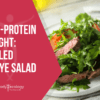Vitamin D Deficiency: Are Stress and High Cortisol Depleting You?
One 2012 study found that vitamin D can help to stall the progression of Alzheimer’s disease. (5) The team of researchers even goes so far as to say that adequate levels of vitamin D may be enough to prevent the onset of Alzheimer’s disease.
According to 2012 Facts and Figures, 5.4 million Americans have this disease. (6) And numbers are climbing. With Alzheimer’s disease on a steady rise, many of us are doing everything we can to keep the mind and the body strong.
Vitamin D Affects More Than Our Bones
Studies have found deficiency across a full spectrum of age groups.
In most people, this deficiency is subclinical. This means that while there may not be any visible signs or symptoms of deficiency, the body is quietly breaking down.
While extreme deficiency of vitamin D will show up in the body as rickets, which is the softening and weakening of bones, we see signs of deficiency in:

You can get natural vitamin D by spending a little time in the sun without sunscreen. But if you don’t go to sleep before midnight, stress hormones in your body may become irregular, decreasing your vitamin D uptake!
- Immune system disorders
- Cardiovascular disease
- Cancer
- Dementia
A 2008 study reported that vitamin D deficiency is “common” among otherwise healthy infants and toddlers, with one third of children showing signs of demineralization. (3) Other research points out that the elderly as well as healthy young adults are at risk, and that vitamin D deficiency typically accompanies other serious health conditions, like heart disease. (4)(5)(6)
The key to understanding this deficiency lies in hormone receptors. And while not every hormone will find a receptor in the body, a hormone without one is like a key with nowhere to go and nothing to do.
Vitamin D functions as a steroid hormone in the body. Other steroid hormones that you may be familiar with are testosterone and estrogen.
Once vitamin D is synthesized (or consumed), it still needs to find a receptor in order to become active in the body. Vitamin D has its own receptor, called vitamin D receptor or VDR.
Certain things are known to inhibit or promote the expression of vitamin D receptor.
A special class of hormones called glucocorticoids is known to decrease expression of vitamin D receptor. The most well known glucocorticoid is cortisol.
Cortisol is a “stress hormone.” It is produced by the adrenal glands and helps the body adapt to stressful situations.
Cortisol also helps the body adjust to the rhythms of the day: in a person with well-regulated cortisol, levels will peak in the morning, around 8 am. Cortisol will reach its lowest levels in the middle of the night, from midnight to 4 am.
Without a receptor, vitamin D is left with nothing to do and nowhere to go; it remains inactive in the body.
Increase Your Vitamin D Through Food
The best way to make vitamin D is to spend a little time in the sunshine without sunscreen or to eat foods that are naturally rich in vitamin D. These are foods like:
- Fatty fish
- High quality cod liver oil
- Egg yolks from pastured hens
- Liver from grass-fed animals
These foods are rich in natural vitamin D3. Avoid foods that are fortified with synthetic vitamin D2, as this form of vitamin D can be toxic in the human body.
A key Body Ecology Principle when eating the above foods is to food combine properly – 80% vegetables, 20% proteins. It is also crucial to digest your proteins well by using enzymes designed for protein and drinking a few ounces of a probiotic beverage with your protein meal.
The best way to use vitamin D3 is to manage stress and make sure that you are asleep well before midnight. A good night’s sleep will help to regulate cortisol levels and promote the use of vitamin D3 – keeping your body and your brain strong!
What to Remember Most About This Article:
Researchers now believe that vitamin D can help to delay and possibly prevent Alzheimer’s disease. Even taking into account fortified milk, supplementation, and daily sunshine, Americans still need more of this vital nutrient. Studies have detected vitamin D deficiencies in a wide range of age groups, leading to cardiovascular disease, cancer, dementia, and immune system disorders.
Certain factors will inhibit the use of vitamin D in your body. The stress hormone cortisol can become irregular if you go to bed past midnight, which will decrease the uptake of vitamin D.
You can make natural vitamin D in your body by spending time in the sun without sunscreen and by eating foods that are naturally rich in vitamin D. Then, it’s important to manage stress and go to sleep before midnight to regulate cortisol; this will ensure that your body uses vitamin D properly to prevent a deficiency!
Product Recommendations:
- [product id=”169″]
- [product id=”14″]
REFERENCES:
- MT Mizwicki, et al. Genomic and Nongenomic Signaling Induced by 1α,25(OH)2-Vitamin D3 Promotes the Recovery of Amyloid-β Phagocytosis by Alzheimer’s Disease Macrophages. J Alzheimers Dis. 2012 Jan 1;29(1):51-62.
- Alzheimer’s Association. 2012 Alzheimer’s disease facts and figures. Alzheimer’s and Dementia: The Journal of the Alzheimer’s Association. March 2012; 8:131–168.
- CM Gordon, et al. Prevalence of vitamin D deficiency among healthy infants and toddlers. Arch Pediatr Adolesc Med. 2008 Jun;162(6):505-12.
- FM Gloth, et al. Vitamin deficiency in homebound elderly persons. JAMA. 1995;274:1683-1686.
- CM Gordon. Prevalence of vitamin D deficiency among healthy adolescents. Arch Pediatr Adol Med. 2004;158:531–537.
- Thomas J. Wang, et al. Vitamin D Deficiency and Risk of Cardiovascular Disease. Circulation. 2008; 117: 503-511








